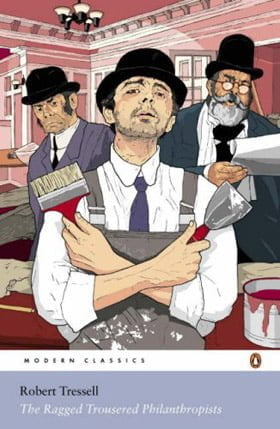Today (Feb 3rd) is the 100th anniversary of the death of Robert Tressel who wrote "The Ragged Trousered Philanthropists."
Today (Feb 3rd) is the 100th anniversary of the death of Robert Tressel who wrote "The Ragged Trousered Philanthropists."
If anything this humourous and cutting account of the fate of a group of workmen employed on doing up a house for a local businessmen has become more relevant over the years. The book can be ordered here .
In that spirit we publish here a letter from Mark Rose, a member of Worcester CLP:
An Absurd System.
In recent times I have found it hard to get myself politically motivated; I have made excuses to comrades and put off doing anything practical in the face of a vicious, ideologically driven coalition who are setting about the task of dismantling the public sector under the guise of ‘deficit reduction’.
What has re-inspired me and made me determined to become more involved in the developing struggle was a chance purchase of a dusty copy of The Ragged Trousered Philanthropists, by Robert Tressell – a book that had been recommended to me by many comrades and on numerous occasions – from a local charity shop. The book not only depicts the harsh realities of the life of the working class, but provides an explanation, through the conversations of the men at work, of how those conditions can be changed – a tactic I have tried myself at work, but lacking the erudition and eloquence of the characters of both Owen and Barrington, I have had limited (probably zero) success with!
One passage particularly resonated with me and encapsulates the current situation for myself as a recent graduate and I am sure millions of others – young and old – that face a future of unemployment in the short term and bleak uncertainty in the long term. It is also a brilliant and scathing attack on the absurdity of the capitalist system and those that administer it:
The management of the affairs of the world is at present in the hands of practical, level-headed, sensible businessmen…the result of their management is, that the majority of the people find it a hard struggle to live…On every side there is superfluity of the materials requisite for the production of all the necessaries of life…an army of people lacking the things that may be made by work, stand idle. Willing to work; clamouring to be allowed to work, and the practical, level headed, sensible businessmen do not know what to do [with them].
As a graduate in the construction industry I am very ‘fortunate’ to have a job, albeit not in the discipline in which I am qualified. Unemployment amongst construction profession graduates – surveying, architecture and engineering – is currently higher than the national average of graduate unemployment in general, which itself is at a 17 year high. (Figures suggest that nearly 12% of graduates of construction related courses are still unemployed by the following January.) Add this to the dearth of trades-based apprenticeships offered in construction industry (40,000 per year are needed for the industry to merely stand still with only 20,000 per annum created BEFORE the recession) and you have the redundant and ’idle’ labour force described by Tressell.
Now, the market logic would say that the lack of job opportunities would suggest a lack of demand. However, nothing could be further from the truth when you consider the needs of society: currently there are 1.2 million households – some 4.5 million people – on the council house waiting list. When you combine this with the millions of others who are exposed to the vagaries of the private rented sector and those ‘lucky’ few that have a mortgage – now finding themselves squeezed to the limit and facing repossession – you have, as far as I see it, a crisis of supply.
Now those ‘level headed, sensible´ people in charge would say that we can’t afford to spend public money in the face of a massive deficit (the one they created themselves) on building houses. They want us to over extend on mortgages and pay exorbitant rent because it lines their pockets; they also make it easier for those who take advantage of the working poor by scrapping fair rent tribunals and by scrapping plans to raise the quality of publically funded houses (the few that are actually built); they even have the temerity to say that the reason that there are waiting lists in the first place is that council houses are full of immigrants and single mums that keep decent ordinary working people (they mean you and me) on the list. Of course they don’t say that there are 2 million less social homes than there was 30 years ago, leading to the few homes that are remaining being occupied by the most vulnerable in society.
The deficit argument against the public funding of council homes is, as far as my limited understanding of economic matters dictates, fallacious: More people in work means more tax intake and less in benefits.
Those people in employment then spend their money on the things they need as well as all that consumer tat that, seemingly, makes the world go round these days. Then you have all the people who now have a decent and GENUINELY affordable home whom, having more disposable income, further help to stimulate the economy. Now, this may be putting it in a very simplistic manner but it seems to make sense to me – building homes is building jobs.
So this year I am determined not to be one those ragged trousered philanthropists that Tressell laments and will doing my own little bit by joining those who take to the streets to affect a change to the pernicious system that that seeks to shackle and steal from those who are indifferent and, at worse, defend it.
Mark Rose, Worcester CLP






